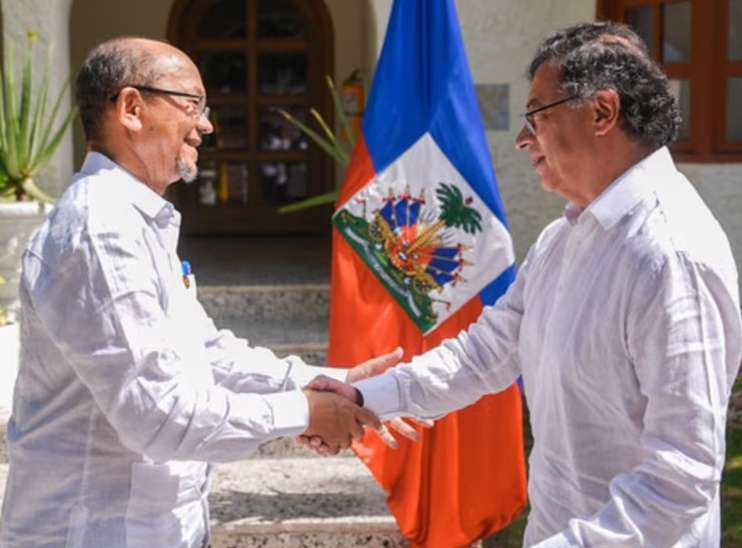Colombia and Haiti Hold Presidential Meeting: Underlying Motives Explored
A pivotal binational Council of Ministers meeting unfolded in Riohacha, Colombia, on December 21, 2024, marking a significant stride in solidifying the relationship between Colombia and Haiti. The meeting, attended by President Gustavo Petro of Colombia and Leslie Voltaire, President of Haiti’s Transitional Presidential Council (KPT), alongside several ministers from both nations, aimed to foster cooperation and address pressing issues facing both countries. Hailed as a historic event by Colombian Foreign Affairs Minister Luis Gilberto Murillo, the meeting signifies a renewed commitment to collaboration between the two nations, a sentiment echoed by Haitian leaders who viewed the event as a milestone in their bilateral relations. The discussions centered on crucial areas of mutual concern, including security, education, and migration.
The focal point of the meeting revolved around enhancing cooperation in security, education, and migration. Recognizing the importance of facilitating travel between the two nations, an agreement was reached to expedite visa processes for individuals holding diplomatic and official passports. This measure aims to streamline diplomatic interactions and foster closer collaboration between government officials. Beyond this practical step, the meeting served as a platform for broader discussions on security cooperation, a critical area of concern for both nations. While details regarding the specifics of security collaborations remain undisclosed, the meeting underscored the mutual recognition of the need for enhanced cooperation in tackling security challenges.
Migration emerged as another key area of discussion, reflecting the intertwined histories and shared challenges faced by both nations. The agreement on expedited visa processing acknowledges the importance of facilitating legal movement between the two countries, particularly for government officials and diplomats. Further details regarding migration-related discussions remain undisclosed, but the focus on streamlining travel processes suggests a commitment to fostering closer ties and addressing migration-related concerns in a collaborative manner. While the immediate impact of the meeting remains to be seen, the commitment to addressing migration issues signifies a positive step towards finding sustainable solutions.
President Petro’s acknowledgement of Haiti’s historical contribution to Colombia’s independence underscored the deep historical ties between the two nations. His statement emphasized the Caribbean identity shared by Colombia and acknowledged Haiti’s pivotal role in its struggle for independence. This recognition not only highlights the historical interconnectedness of the two nations but also underscores the importance of renewed collaboration in addressing present-day challenges. Petro’s statement serves as a reminder of the shared history and the potential for future collaboration based on mutual respect and understanding.
The invitation extended to President Petro to visit Haiti symbolizes the commitment to fostering stronger ties between the two nations. This prospective visit holds the potential to further solidify the relationship and pave the way for more concrete collaborations in areas of mutual interest. While the details of the potential visit remain undisclosed, the invitation signifies a proactive approach towards strengthening bilateral relations and exploring avenues for deeper cooperation. The potential visit represents an opportunity to build upon the momentum generated by the binational meeting and translate the discussions into tangible actions.
Despite the positive strides made during the meeting, certain key questions remain unanswered. The absence of any announcements regarding Colombian assistance in restoring order in Haiti leaves a critical aspect of the relationship unaddressed. While security cooperation was discussed, the lack of concrete commitments regarding potential support raises questions about the extent of Colombia’s willingness to engage in addressing Haiti’s ongoing security crisis. Similarly, the true purpose of the meeting, beyond the ceremonial aspects, remains somewhat ambiguous. While strengthening bilateral relations and addressing key issues were ostensibly the primary objectives, the lack of detailed information regarding specific outcomes leaves room for speculation about the underlying motivations and potential undisclosed agendas.
The meeting, while undoubtedly a significant step in fostering closer ties between Colombia and Haiti, also highlights the complex and nuanced nature of the relationship. The emphasis on historical connections, coupled with the discussions on critical issues such as security and migration, points towards a renewed commitment to collaboration. However, the lack of concrete announcements regarding security assistance and the somewhat opaque nature of the meeting’s true purpose leave important questions unanswered. Moving forward, the success of this renewed engagement will depend on the ability of both nations to translate the positive momentum generated by the meeting into tangible actions that address the pressing challenges facing both countries. The potential visit of President Petro to Haiti will be a crucial opportunity to further solidify the relationship and demonstrate a commitment to concrete collaborations that yield tangible results.
Share this content:












Post Comment